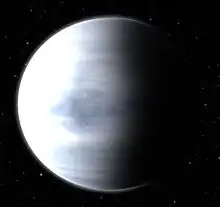Kepler-443b
Kepler-443b is an exoplanet about 2,540 light-years from Earth.[2] It has an 89.9 percent chance of being in the star's habitable zone, yet only a 4.9 percent chance of being rocky.[1]
 | |
| Discovery | |
|---|---|
| Discovered by | Guillermo Torres et al.[1] |
| Discovery site | Kepler |
| Discovery date | January 7, 2015 |
| Transit method | |
| Orbital characteristics | |
| 0.495 AU (74,100,000 km)[1] | |
| Eccentricity | ≥0.11[1] |
| 177.6693[1] d | |
| Inclination | 89.94[1] |
| JD 2455630.2460[1] | |
| Star | Kepler-443 |
| Physical characteristics | |
Mean radius | 2.33[1] R⊕ |
Characteristics
Mass, radius and temperature
Kepler-443b has a mass of 6.04 Earth masses,[3] a radius of 2.33 Earth radii[2] and a temperature of 247 kelvin.[2]
Orbit
Kepler-443b takes 177.6693 days to orbit its star, with an inclination of 89.94°, a semimajor axis of 0.495 AU and an eccentricity of at least 0.11.[2]
Habitability
Kepler-443b may be habitable, but the planet has only a 4.9 percent chance of being rocky.[1] The planet is much more likely to be a water world or a Mini-Neptune.
References
- . arXiv:1501.01101. Bibcode:2015ApJ...800...99T. doi:10.1088/0004-637X/800/2/99. Cite journal requires
|journal=(help); Missing or empty|title=(help) - "HEC: Data of Potentially Habitable Worlds". Planetary Habitability Laboratory. 15 November 2017. Retrieved 17 April 2018.
- "Eyes on Exoplanets-Kepler-443b".
This article is issued from Wikipedia. The text is licensed under Creative Commons - Attribution - Sharealike. Additional terms may apply for the media files.